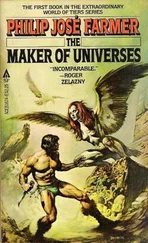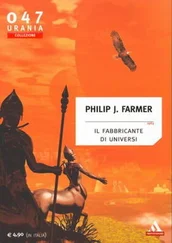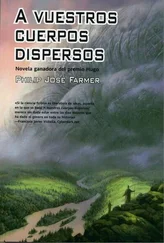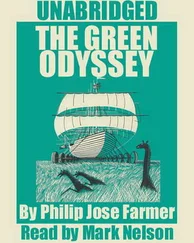Days passed. The ship drifted with the current. When storms came, he closed the port and rode them out. And then, one day, while he was studying at the control panel in the bridge, he felt a jar run through the ship. He turned on the exterior-view TV and saw what he had hoped for. The nose of the Hwang Ho was stuck in the mud of the shore of a big bay. In front of it was the slope of a mountain.
Simon went out with the dog and the owl next day and looked around. Contrary to what he had first thought, they were not on a mountain but on a saddle between two peaks.
Simon walked up the slope of the nearest mountain.
Halfway up, he came across a stone tablet lying on its face, half-buried in mud that had carried it down from a higher level. He heaved it upright and read the inscription on its face.
ON SEPT. 27, 1829, J. J. VON PARROT, A GERMAN CITIZEN, BECAME THE FIRST MAN TO CLIMB TO THE TOP OF MOUNT ARARAT, 16,945 FEET ABOVE SEA LEVEL. HE DID NOT FIND THE ARK, BUT HE ENJOYED THE VIEW WHILE EATINC A SALAMI SANDWICH. THIS WAS 58 YEARS BEFORE “THE PAUSE THAT REFRESHES.”
Courtesy of Coca Cola Co.
Simon had arrived in his ark at the same place where Noah was supposed to have landed. This was a coincidence that could only happen in a bad novel, but Nature didn’t give a damn about literary esthetics. The grasshopper voices of thousands of critics had shrilled at Her and then died while She went right on ahead writing Her stories, none of which had a happy ending.
Simon didn’t now believe in the Biblical account of the flood. But as a child he’d taken it seriously. When he went to high school, however, he began to have his doubts. So he’d gone to a nice old rabbi named Isaac Apfelbaum and had asked him why the book of Genesis told such bare-faced lies as the stories of the Garden of Eden, angels knocking up the daughters of men, the flood, the tower of Babel, etc.
The rabbi had sighed and then had patiently explained that the holy scriptures of any people were not meant to be scientific textbooks. They were parables to teach people how to be good-hearted and how to stay within certain limits of behavior so life would go as smoothly as possible. They were, in effect, guidebooks to heaven on earth and, hopefully, to the afterworld. Wise old men had worked out the guidelines as the best way to stay out of trouble.
“None of them were written by wise old women?” Simon had said. “Why? Do men have a monopoly on truth?”
“You forget Mary Baker Eddy,” the rabbi had said.
“She was in ill health all her life,” Simon said. “Can a sick person truly be wise?”
The rabbi ignored that. He wasn’t keen on pumping the competition, anyway.
“And how come the guidebooks are all different?” Simon had said. He was thinking of that question now as he stared around at Mount Ararat. He was also thinking of the guidebooks he’d picked up just before the picnic. If men couldn’t agree on the measurements of the Sphinx, a finite physical object, how could they ever blueprint heaven? If heaven existed, that is. Simon hadn’t said so to the rabbi, but he thought there was as much justification in believing in the Yellow Brick Road as in the Pearly Gates.
“The guidebooks just send you down different paths,” the rabbi had said. “But the end result is the same. All roads lead to Rome.”
The rabbi had shut up then. If he kept on, he’d be converting the kid to Catholicism.
Simon looked at the writings that post-Parrot climbers had felt impelled to scratch on the tablet. Some wag had scratched below the bottom line of the inscription: I wuz here furst. noah.
Another wag had scratched below that: NO, I WAS HERE FIRST, YOU ILLITERATE BASTARD. GOD.
On the side, running vertically, was a later INSCRIPTION: GRAFFITI WRITERS SUCK.
Running alongside that was a later one: O.K. I’LL MEET YOU IN THE MEN’S ROOM, UN BUILDING LOBBY.
On the other side of the main text, also running vertically, was: DOESN’T ANYBODY LOVE ANYBODY?
Under that Simon scratched with his screwdriver: I DO, BUT THERE’S NOBODY LEFT TO LOVE.
After he’d done it, he felt ridiculous. He also felt like crying. He was the last of the fools whose names and faces oft appear in public places. What a last will and testament! Who, besides himself, the lone survivor, was around to read it?
A moment later, he found out.
 4
4 
WHAT’S THE SCORE?
The old man that staggered babbling toward him looked as if he was a hundred years old. His head was bald, and he had a long gray beard that fell to his knees. His clothes were of a style that had gone out of fashion over six hundred years ago. The old man wasn’t even born then. So why was he wearing yellow kid gloves, a white ruff, and a coat too tight in the waist?
Simon conducted the old man into the Hwang Ho. He sat him down in an easy chair and gave him a glass of rice wine. The old man drank it all at once, and then, holding Simon with a skinny hand, he spoke.
“Who won the series?”
“What?” Simon said. “What series?”
“The World Series of 2457,” the old man said. “Was it the St Louis Cardinals or the Tokyo Tigers?”
“For God’s sake, how would I know?” Simon said.
The old man groaned and poured himself another glass of wine. He smelled it, wrinkled his nose, and said, “You got any beer?”
“Just German beer,” Simon said.
“That’ll have to do,” the old man said. “Oh, how I’ve longed all these centuries for a cold glass of American beer. Especially good old St Louis-brewed beer!”
Simon went into the pantry for the only bottle of Lowenbrau left. This must have been the property of the sole German sailor aboard. By his bunk were portraits of Beethoven, Bismarck, Hitler (after a millennium a romantic hero), and Otto Munchkin, the first man to die in a Volkswagen. The sailor also had a small library, mostly Chinese or German books. Simon had been intrigued by the title of one, Die Fahrt der Snark, but it turned out not to be a commentary on Lewis Carroll’s digestive problems after all. It was all about a journey some early 20th-century writer named Jack London had made to the South Seas. London had later on committed suicide when the people he loved and trusted gave him the shaft.
Simon returned to the old man and handed him the beer.
“Do you remember now?” the ancient said.
“Remember what?”
“Who won the series?”
“I never cared for baseball,” Simon said. “You are talking about baseball, aren’t you?”
“I thought you were an American?”
“There are no nationalities anymore,” Simon said. “Just Earth people, an endangered species. What’s your name?”
“Silas T. Comberbacke, Spaceman First Class,” the old man said. He drank deeply and sighed with ecstasy. But he said, “Those Germans never did learn to make good beer.”
Once Comberbacke’s mind was off baseball, he talked as if he hadn’t seen a human being in six hundred years. Which was true. He’d left Earth in A.D. 2457 because his fiancée had run off with a hairdresser.
“Which gives you some idea of her basic personality,” old Comberbacke said. “Jesus, he knew nothing about baseball!”
One day, while drinking in a bar on a planet in Galaxy NGC 7217, Comberbacke suddenly decided to go home and find out who won the 2457 series. He’d been asking other spacemen for years, but even the aficionados didn’t know. They were all too young to remember that far back. So, on impulse, he’d signed up as a S1C on a Ugandan freighter and was headed directly home—he thought. On the way, though, the ship had received a Mayday from a planet in NGC 5128.
Читать дальше
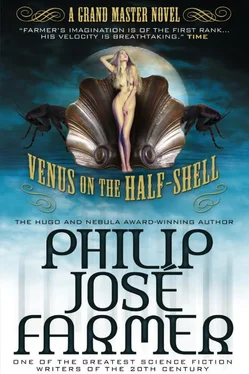
 4
4 

